Generic Medicines
Taj Pharma is the largest generic pharmaceutical company in India. We hold top positions in different established markets worldwide generics markets..
The Muslim-majority state of Pakistan occupies an area which was home to some of the earliest human settlements and where two of the world's major religions Hinduism and Buddhism were practised.
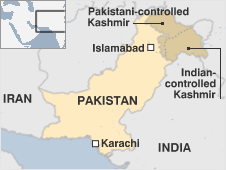 |
The modern state was born out of the partition of the Indian sub-continent in 1947 and has faced both domestic political upheavals and regional confrontations.
Created to meet the demands of Indian Muslims for their own homeland Pakistan was originally in two parts.
The east wing - present-day Bangladesh - is on the Bay of Bengal bordering India and Burma. The west wing - present-day Pakistan - stretches from the Himalayas down to the Arabian Sea.
The break-up of the two wings came in 1971 when the mainly Bengali-speaking east wing seceded with help from India.
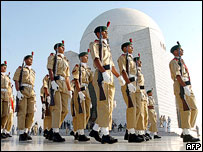
A marble edifice honours Pakistan's founder Mohammed Ali Jinnah
|
The disputed northern territory of Kashmir has been the flashpoint for two of the three India-Pakistan wars - those of 1947-8 and 1965. There was a further brief but bitter armed conflict after Islamic militants infiltrated Indian-administered Kashmir in 1999.
Civilian politics in Pakistan in the last few decades has been tarnished by corruption inefficiency and confrontations between various institutions. Alternating periods of civilian and military rule have not helped to establish stability.
Pakistan came under military rule again in October 1999 after the ousting of a civilian government that had lost a great deal of public support.
The coup leader General Pervez Musharraf pledged to revive the country's fortunes but faced economic challenges as well as an increasing polarisation between Islamist militancy and the modernising secular wing of Pakistani politics.
Mr Musharraf eventually relinquished his army post in November 2007 but at parliamentary elections in February 2008 his supporters were defeated by the opposition Pakistan People's Party and former PM Nawaz Sharif's Muslim League.
The two parties formed a coalition government led by the PPP's Yusuf Raza Gilani and an impeachment process was launched against Mr Musharraf who resigned in August 2008.
Pakistan's place on the world stage shifted after the 11 September 2001 attacks in the US. It dropped its support for the Taliban regime in Afghanistan and was propelled into the frontline in the fight against terrorism becoming a key ally of Washington.
However Pakistani forces have struggled to maintain control over the restive tribal regions along the Afghan border where Taliban-linked militants are firmly entrenched.
In the spring of 2009 the government attempted to reduce disaffection in the troubled north-western Swat district by agreeing to the imposition of Sharia law.
Far from improving security this move allowed the Taliban to tighten their grip on the region and the agreement broke down after only a few weeks. Since then the government has waged a rolling military campaign to flush the militants out of the tribal areas.
Tensions with India over Kashmir have resurfaced regularly ever since the partition of the sub-continent and the two nuclear-armed powers have on numerous occasions been on the brink of renewed conflict.
India has accused Pakistan of failing to cooperate adequately over the investigation into the November 2008 extremist attacks in Mumbai and has halted talks on improving relations.
President: Asif Ali Zardari
Asif Ali Zardari won the presidential race of 6 September 2008 by a big majority. His election by Pakistan's legislators came a few weeks after his predecessor Pervez Musharraf resigned under threat of impeachment.
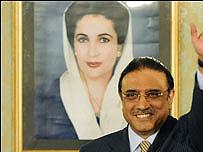 President Zardari faces formidable challenges
|
At his swearing-in ceremony Mr Zardari said he was accepting the post of president in the name of his assassinated wife Benazir Bhutto.
Mr Zardari had long lived in the shadow of his late charismatic wife who was twice Pakistan's prime minister and head of the Pakistan People's Party (PPP) - a position Mr Zardari inherited upon her death in December 2007.
Asif Zardari married Ms Bhutto in 1987 and held the positions of federal environment minister and federal investment minister during her tenure as premier.
But Mr Zardari was also controversially referred to as "Mr 10%" following allegations of corruption. For this and for murder charges of which he was later cleared he spent two separate terms in prison totalling eleven and a half years.
On becoming president Mr Zardari pledged to tackle the problem of Islamic militancy. In response to allegations that the devastating terrorist attack on the Indian city of Mumbai in November 2008 was orchestrated in Pakistan he insisted that his country was itself a victim of terrorism and was ready to cooperate with other countries in the fight against terrorism.
Asif Ali Zardari was born on 26 July 1955. He comes from a prominent family in Pakistan's Sindh province and has one son and two daughters. His son Bilawal Zardari was born in 1988 and is co-chairman of the Pakistan People's Party.
Prime Minister: Yusuf Raza Gilani
Yusuf Raza Gilani became the head of the coalition government in March 2008 after the Pakistan People's Party (PPP) won the most votes in elections in February.
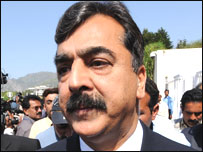
Mr Gilani has learned a reputation as a PPP loyalist
|
Mr Gilani had long been a respected figure within the PPP. He joined the party in 1988 when it was still very much in the political wilderness and soon earned a reputation for unwavering loyalty to the Bhutto family.
He was Speaker of parliament from 1993 to 1996 during Benazir Bhutto's second stint as premier.
In 2001 two years after Pervez Musharraf seized power in a military coup Mr Gilani was found guilty of making illegal government appointments while Speaker and was jailed for five years.
He maintains that the charges were brought as part of an attempt by Mr Musharraf to pressurise him into leaving the PPP. He was exonerated and freed in 2006.
Mr Gilani was born in 1952 in Karachi but his family comes from the Punjab and was active in Punjabi politics for generations. His grandfather and great-uncles were members of the All-India Muslim League which campaigned for a separate state for Muslims and his father served as a provincial minister during the 1950s.
After completing an MA in journalism at the University of Punjab Mr Gilani first entered politics in 1978 as a member of the Muslim League but ten years later switched to the PPP.
Pervez Musharraf's rule ushered in increased freedom for the print media and a liberalisation of broadcasting policies. Towards the end of his time in office however media rules were tightened under emergency rule.
A coalition government formed in early 2008 pledged to undo measures introduced by the former president.
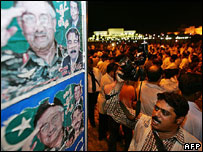 Journalists protested against media curbs in 2007
|
Television is the dominant medium and there are around 50 private channels. The overwhelming majority of viewers receive them via cable. There are no private terrestrial stations.
More than 100 private FM radio stations have been licensed. They are not allowed to broadcast their own news programmes.
Scores of unlicensed FM stations are said to operate in the tribal areas of North-West Frontier Province. They are usually operated by clerics. Some of them are accused of fanning sectarian tension.
The government uses legal and constitutional powers to curb press freedom. Private TV news channels were closed under a state of emergency in late 2007 and the law on blasphemy has been used against journalists.
The broadcasting regulator can order a halt to the carriage of foreign TV channels via cable particularly Indian or Afghan ones. This usually coincides with periods of tension between Pakistan and one or other of its neighbours.
Pakistan's press is among the most outspoken in South Asia although its influence is limited by a literacy level of around 50%.
World telecoms body the ITU estimated in March 2008 that there were 17.5 million internet users. The authorities filter some websites. A growing number of bloggers write about politics.
The press
Television
Radio
News agency
Associated Press of Pakistan (APP) - state-funded
AFRICA | ASIA-PACIFIC | AMERICAS | EUROPE | MIDDLEEAST | SOUTHASIA
![]()
![]()
![]()
Mauritania Mauritius Morocco Mozambique Namibia Niger Nigeria Republic-of-congo Rwanda Sao-tome-and-principe Senegal Seychelles Sierra-leone Somalia South-africa Sudan Swaziland Tanzania The-gambia Togo Tunisia Uganda Australia Brunei Burma Cambodia China East-timor Fiji Indonesia Japan Kazakhstan Kiribati Kyrgyzstan Laos Malaysia Marshall-islands Micronesia Mongolia Nauru New-zealand North-korea Palau Papua-new-guinea Samoa Singapore Solomon-islands South-korea Taiwan Tajikistan Thailand The-philippines Tonga Turkmenistan Tuvalu Uzbekistan Vanuatu Vietnam Antigua-and-barbuda Belize Bolivia Brazil Canada Chile Colombia Costa-rica Cuba Dominica Dominican-republic Ecuador El-salvador Grenada Guatemala Guyana Haiti Honduras Jamaica Mexico Nicaragua St-kitts-and-nevis St-lucia Suriname Trinidad-and-tobago Uruguay Venezuela Albania Andorra Armenia Austria Azerbaijan Belarus Belgium Bosnia-hercegovina Bulgaria Croatia Cyprus Czech-republic Denmark Estonia Finland France Georgia Germany Greece Hungary Iceland Ireland Italy Latvia Liechtenstein Lithuania Luxembourg Macedonia Malta Moldova Monaco Montenegro Norway Poland Portugal Russia San-marino Serbia Slovakia Slovenia Spain Sweden Algeria Egypt Iran Iraq Israel-and-palestinian-territories Jordan Kuwait Lebanon Libya Mauritania Oman Saudi-arabia Sudan Syria Tunisia United-arab-emirates Yemen Afghanistan Bangladesh Bhutan India Nepal Pakistan Sri-Lanka The-Maldive